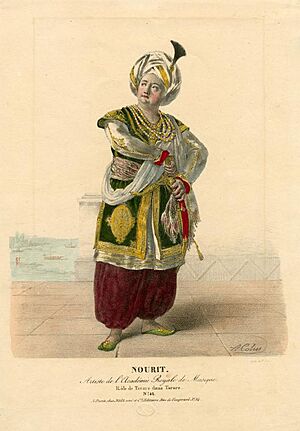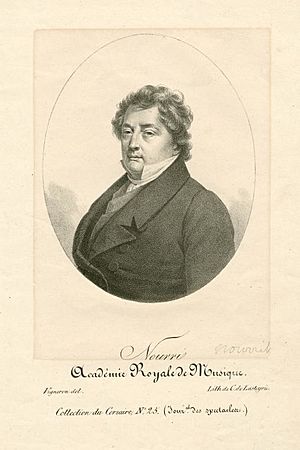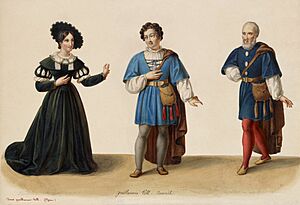Adolphe Nourrit facts for kids
Adolphe Nourrit (born March 3, 1802 – died March 8, 1839) was a famous French opera singer, a tenor (a male singer with a high voice). He also wrote stories for operas (called librettist) and composed music. Adolphe Nourrit was one of the most popular opera stars in the 1820s and 1830s. He was especially known for singing in operas by Gioachino Rossini and Giacomo Meyerbeer.
Contents
Growing Up and Learning to Sing
Adolphe Nourrit was born on March 3, 1802, in Montpellier, France. His father, Louis Nourrit, was also a well-known opera singer and a diamond seller. Louis's singing greatly inspired Adolphe and his brother, Auguste, who also became a tenor.
Adolphe learned singing and music theory from his father. Later, even though his father didn't want him to, Adolphe took lessons from a famous teacher named Manuel del Pópulo Vicente García. After about 18 months of studying with García, Adolphe started his own singing career.
A Star on Stage
When he was not yet 20 years old, Adolphe Nourrit made his first professional opera appearance in 1821. He sang the role of Pylades in an opera called Iphigénie en Tauride. His father was also on stage, singing a small part. In 1826, Adolphe took over from his father as the main tenor at the famous Paris Opéra. He held this important position until 1836.
While at the Opéra, Nourrit became a student of the famous composer Gioachino Rossini. They worked together often. Nourrit created the main tenor roles in all of Rossini's French operas. These included:
- Néocles in Le siège de Corinthe (1826)
- Aménophis in Moïse et Pharaon (1827)
- The main role in Le comte Ory (1828)
- Arnold in William Tell (1829)
He was also the first to sing other important roles, such as:
- Masaniello in Auber's La muette de Portici (1828)
- Robert in Meyerbeer's Robert le Diable (1831)
- Eleazar in Halévy's La Juive (1835)
- Raoul in Meyerbeer's Les Huguenots (1836)
An interesting event happened when La muette de Portici was performed in Brussels in 1830. A song from the opera, "Amour sacré de la patrie" (Sacred love of the homeland), which Nourrit sang, helped spark the "opera riot" that led to the Belgian Revolution.
Nourrit's Singing Style
Adolphe Nourrit was known as a very smart and cultured singer. His voice was smooth and powerful, especially when he was at his best. He was a master of using his head voice, which is a way of singing higher notes. His voice could reach very high notes, though he usually didn't sing higher than D5 in public.
Nourrit sang during a time when French opera singing was changing. Singers started using a more open and Italian-like way of singing, using less falsetto (a very light, airy voice) for high notes. The music written for Nourrit by composers like Rossini and Giacomo Meyerbeer shows that he sang his high notes with a full, strong voice, not falsetto. This was a new and exciting way of singing for male opera stars back then.
Influence and Teaching
As Nourrit became more famous at the Opéra, he also gained more influence over new opera productions. Composers often asked for his advice, and they usually took it! For example, for the opera La Juive, he wrote the words for a famous song called "Rachel, quand du Seigneur." He also insisted that Meyerbeer rewrite a love duet in Les Huguenots until it was perfect.
Nourrit always received great reviews for his performances. His popularity led to him becoming a professor at the Conservatoire de Paris in 1827. He taught many successful students, including the famous singer Cornélie Falcon. Nourrit also cared about how singing could help society. In the early 1830s, he believed in the ideas of Saint-Simonianism, which was a social movement. He dreamed of creating a big "people's opera" that would bring opera to everyone, not just the wealthy.

Besides singing and teaching, Nourrit also wrote stories for ballets at the Opéra de Paris. One of his most famous works was the libretto (story) for the ballet La Sylphide (1832).
Later Career and Struggles
Nourrit's fame began to fade in the late 1830s as new singers became popular in Paris. In October 1836, a new singer named Gilbert Duprez joined the Opéra de Paris. Duprez was known for his exciting high C note, sung from the chest. Nourrit agreed to share the "First Tenor" spot with Duprez.
On October 5, 1836, Nourrit sang his part in Guillaume Tell very well, with Duprez in the audience. But five days later, during La muette de Portici, Nourrit suddenly lost his voice. On October 14, he resigned from the Opéra.
Even during this difficult time, Nourrit was successful as a concert singer. He was the first to introduce the songs (called lieder) of Franz Schubert to audiences in Paris. He performed these at special evening concerts organized by Franz Liszt in 1837. These smaller, more personal concerts seemed to suit him well. Even though some said his voice was weaker, his singing showed amazing feelings and a wide range of drama. His final performance at the Opéra was on April 1, 1837.
In November 1837, after hearing Duprez sing, Nourrit decided to go to Italy. He hoped to learn the Italian style of singing to replace the great Italian tenor Giovanni Battista Rubini when he retired. He left Paris in December. The next March, he began studying in Naples with the composer Gaetano Donizetti.
Nourrit also asked Donizetti to write an opera for his debut in Naples. Donizetti agreed, but the new opera, Poliuto, was banned by the authorities because it was about a Christian story. Nourrit felt let down. Meanwhile, he had been working hard to change his singing style, but this caused him to lose his head voice. When his wife arrived in Italy in July 1838, she was worried by how his singing sounded and how weak he looked.
Despite these challenges, his first performance in Naples, in Saverio Mercadante's Il giuramento on November 14, 1838, was a success.
Death
Adolphe Nourrit's health and mental state got worse. His memory also started to fail. On March 7, 1839, he sang at a benefit concert but was very disappointed with his performance and how the audience reacted. The next morning, March 8, 1839, he tragically jumped to his death from the Hotel Barbaia.
His body was brought back to Paris for burial. In Marseilles, while his body was being moved, Frédéric Chopin played a special organ version of Schubert's song Die Gestirne at a memorial service.
Adolphe Nourrit is buried in Montmartre Cemetery in Paris with his wife. She passed away only a few months after him, shortly after their youngest son was born.
Images for kids
-
Nourrit in the main role of Tarare by Antonio Salieri
See also
 In Spanish: Adolphe Nourrit para niños
In Spanish: Adolphe Nourrit para niños
- Ballets by Adolphe Nourrit
 | Janet Taylor Pickett |
 | Synthia Saint James |
 | Howardena Pindell |
 | Faith Ringgold |




